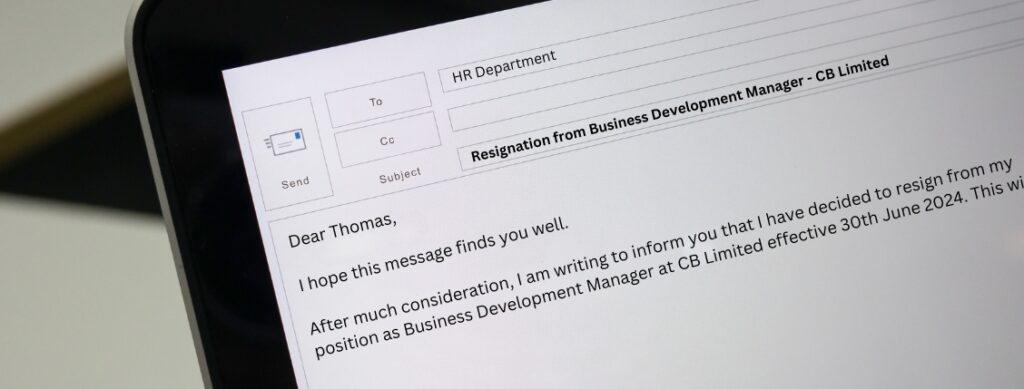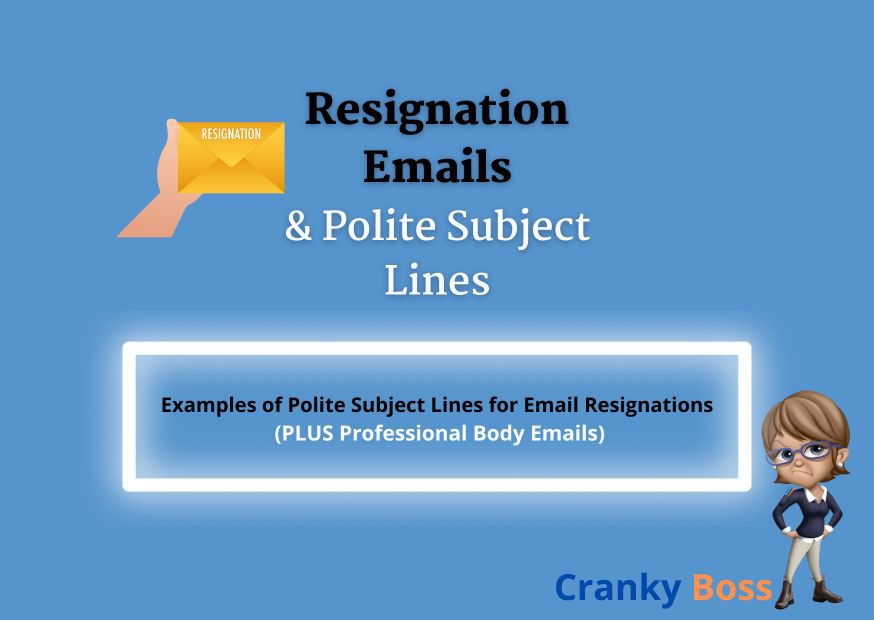When it comes to resigning from a job, doing so professionally and respectfully is very important. One way to ensure that your resignation is seen in a positive light is to use a polite subject line for your resignation email. The subject line is the first thing your employer will see, so it’s essential that it conveys the message appropriately.
Here’s how to politely resign in an email and some examples of polite subject lines for resignation emails. The body of the email is equally important so we will also look at writing a professional resignation email body as well.
How Do You Politely Resign in an Email?
Tendering a resignation can be a difficult decision and doing so through an email can sometimes feel impersonal. However, if you are unable to meet your employer in person, resigning via email is an acceptable option. To resign politely through email, you should ensure that your tone is professional, your message is clear, and your intentions are respectful.
A subject line for a resignation email that is polite, can help set the right tone. It is important to keep the subject line straightforward and respectful.
For example, the two most common would be:
- “Resignation from [Your Position] – [Your Name].”
- “Notice of Resignation – [Your Name].”
These subject lines make it clear what the email is about without sounding harsh or abrupt.

Here are some additional good subject lines for a resignation email:
- “Stepping Down from [Position] – [Your Name]”
- “Resignation letter – [Your Name]”
- “Formal Resignation – [Your Name], [Position]”
- “Intent to Resign – [Your Name]”
- “Resignation Notification – [Your Name], [Department]”
Resignation Email Body
The body of your resignation email is where you will provide the details of your departure. It should be concise yet polite, and it’s important to include specific information such as your last working day. In the body of the email, you should also offer to help with the transition period.
This gesture demonstrates professionalism and ensures that your departure does not negatively affect the company.
Here are some tips for structuring the body of a resignation email:
- Start with a polite greeting: Address your manager or HR representative respectfully, and include their name.
- State your intention to resign clearly: Use phrases like “I am writing to formally resign from my position as [Job Title] at [Company Name].” Avoid being vague, as you want your message to be understood without confusion.
- Provide your notice period: Most companies require a two-week notice period, but it’s important to check your employment contract for any specific requirements. Mention your last working day in the email to give your employer a clear timeline.
- Express gratitude: Thank your employer for the opportunities you have had at the company. This shows appreciation and keeps the tone positive.
- Offer assistance with the transition: Offering help during the transition period, such as training a replacement or handing over projects, demonstrates professionalism and goodwill.
- End on a positive note: Close your email with a positive, forward-looking statement. Wishing the company continued success is a good way to leave on good terms.
An example of how to politely resign in an email could look like this:
Subject Line: Resignation from [Your Position]
Dear [Manager’s Name],
I hope this message finds you well. After much consideration, I am writing to inform you that I have decided to resign from my position as [Your Job Title] at [Company Name], effective [Last Working Day, typically two weeks from the date of the email].
I am grateful for the opportunity to work at [Company Name] and have appreciated the support and guidance I’ve received during my time here. This has been a valuable experience, and I am committed to ensuring a smooth transition during my remaining time.
Please let me know how I can assist with transferring my responsibilities or helping with the transition process. I would be happy to offer any help that would make this change as seamless as possible.
Thank you once again for the opportunities and experiences I’ve had at [Company Name]. I wish you and the team continued success in the future.
Sincerely,
[Your Full Name]
Should you state the reason for the resignation?
When writing a resignation email, it is not always necessary to state the reason for your resignation. Whether or not to include the reason depends on the situation and your relationship with your employer. In many cases, keeping the email brief and professional without diving into personal details is perfectly acceptable. However, there are some factors to consider when deciding whether to include the reason for your resignation:
When You Should State the Reason for Resignation
When It’s a Positive or Neutral Reason: If your resignation is due to a positive or neutral reason, such as moving to a new city, pursuing further education, or advancing your career with a new opportunity, it can be helpful to share this information. It shows that your departure is not due to dissatisfaction with the company and can help maintain a positive relationship.
Example:
I am resigning because I have accepted a new position that aligns with my long-term career goals.
When You Have a Good Relationship with Your Employer: If you have a strong, open relationship with your employer, providing a reason might be appreciated. It shows transparency and honesty, especially if the reason for your resignation is understandable and won’t create conflict.
When Your Contract Requires It: In some cases, employment contracts or company policies may require you to give a reason for your resignation. If this is the case, it’s best to provide a clear but brief explanation.
When You Should NOT State the Reason for Resignation
When It’s Due to Personal or Sensitive Issues: If your resignation is due to personal reasons, such as family matters or health concerns, you are not obligated to disclose these details. A simple, polite statement will suffice without sharing sensitive information.
Example:
I have made the difficult decision to resign for personal reasons.
When It’s Due to Dissatisfaction: If you are resigning because of dissatisfaction with your role, coworkers, or company culture, it is generally better to avoid going into detail in the resignation email. Leaving on a positive note is important, and venting frustrations in a resignation email could harm future relationships or references.
Example:
After careful consideration, I have decided to resign to pursue new opportunities.
When You Want to Keep the Email Brief: If you prefer to keep your resignation email simple and professional, it’s entirely acceptable to skip the reason and focus on the key information: your resignation, last working day, and offer to help with the transition.
Including the reason for your resignation is optional and depends on the situation. If you feel comfortable sharing the reason, and it’s appropriate for the context, doing so can add transparency and goodwill. However, if you’d rather not disclose it, you can still resign professionally and courteously without providing a reason.
What about exit surveys? How should they be handled?
Exit surveys are often used by companies to gather feedback from employees who are leaving. They provide valuable insights into the reasons for turnover and can help the organization improve its work environment and management practices. However, as an employee, it’s important to handle exit surveys thoughtfully and professionally.

Here are some key points on how to handle exit surveys:
1. Be Honest but Diplomatic
While it’s important to be honest in an exit survey, especially if the company genuinely seeks to improve, it’s also important to remain diplomatic. Avoid being overly negative or harsh in your feedback, as this could damage relationships and hurt your reputation. Focus on providing constructive criticism rather than venting frustrations.
- Example of constructive feedback: “I found the workload challenging at times, and additional resources in our department could improve overall productivity.”
- Avoid: “The management was terrible, and the workload was unbearable.”
2. Provide Specific Feedback
Specific, actionable feedback is more valuable to the company than vague statements. If there were particular aspects of the job or workplace that led to your resignation, provide examples that can help the organization understand the issues.
- Example: “I believe better communication between teams would enhance project efficiency. For instance, we often faced delays because expectations weren’t clearly communicated across departments.”
This kind of specific feedback helps the company identify areas for improvement.
3. Highlight Positive Experiences
It’s a good idea to balance any criticism with positive feedback. Acknowledge the things that the company did well during your time there, such as opportunities for learning, a supportive work environment, or helpful colleagues. This not only shows that you’re leaving on good terms but also helps the company recognize its strengths.
- Example: “I appreciated the mentorship I received from my manager. It helped me grow professionally and improve my skills.”
4. Maintain Professionalism
Just like in your resignation email, it’s crucial to remain professional when filling out an exit survey. Avoid emotional language or personal attacks. The goal is to provide feedback that is useful and constructive, not to criticize or blame anyone personally.
5. Respect Confidentiality (If Applicable)
Some companies assure employees that exit surveys are confidential, while others may share feedback with management. If the survey is confidential, feel free to share your thoughts more openly. However, if your feedback may be shared, you should be mindful of how your comments may be perceived by your former managers and coworkers.
If you’re unsure about confidentiality, it’s wise to ask HR whether your feedback will be anonymous.
6. Be Brief and Clear
Exit surveys should not take up too much of your time. Provide concise, clear answers to the questions. Avoid writing long, detailed accounts of every negative experience you had, and instead focus on the key points that matter most.
7. Don’t Burn Bridges
Even though you’re leaving, it’s important not to damage the professional relationships you’ve built during your time with the company. The way you complete the exit survey can reflect your professionalism. You never know when you might cross paths with former colleagues or managers, so leaving on good terms is always a smart move. Try and steer clear from practices such as loud quitting. There is no long term benefit here.
8. Consider Declining the Survey (If Necessary)
If you feel uncomfortable providing feedback, especially if the survey isn’t anonymous or if you have concerns about repercussions, it’s acceptable to decline the exit survey. While many companies value this feedback, they typically don’t make it mandatory. If you choose to skip the survey, simply thank them for the opportunity and explain that you prefer not to participate.
Example: “Thank you for offering the opportunity to provide feedback. However, I would prefer not to complete the exit survey at this time.”
Summary of How to Handle Exit Surveys
- Be honest but diplomatic in your responses.
- Be mindful of your verbal and non verbal communication.
- Provide specific, constructive feedback.
- Highlight positive experiences along with any criticisms. Avoid backhanded compliments.
- Maintain a professional tone throughout.
- Respect confidentiality, if applicable.
- Keep your answers brief and clear.
- Avoid burning bridges by being respectful in your feedback.
- If uncomfortable, consider politely declining the survey.
Handling exit surveys professionally ensures you leave the company on good terms while offering helpful feedback. Put your soft skills in place and exit with grace and dignity. Remember that your responses may contribute to positive changes within the organization, so providing thoughtful and constructive feedback can be valuable for both you and the company.
What Is the Subject Line for a Farewell Email?
A farewell email is different from a resignation email. While the resignation email is typically sent to your manager or HR, the farewell email is sent to your colleagues or team members to inform them of your departure. Like the resignation email, the polite subject line for your farewell email should be clear and courteous.
Some subject lines you can use for a farewell email include:
- “Thank You and Farewell”
- “Goodbye and Best Wishes”
- “Farewell: My Last Day at [Company Name]”
- “Thank You for the Opportunity”
These subject lines convey warmth and gratitude while letting your colleagues know that the email is about your departure. It is important to keep the tone of the email positive and thankful, highlighting the good memories and experiences you had during your time with the company.
Here is an example of a farewell email:
Subject Line: Thank You and Farewell
Dear Team,
I wanted to take a moment to express my gratitude as I say farewell. As many of you may already know, I will be leaving [Company Name] on [Date]. The decision was not an easy one, but I am excited about the new opportunities ahead.
Working with such a talented and supportive team has been a privilege. I have learned so much from each of you, and I truly appreciate the camaraderie and encouragement that has been a part of my experience here.
Although I am sad to be leaving, I am looking forward to staying in touch. Please feel free to reach out to me at [Personal Email] or connect with me on [Social Media Platform].
Thank you all once again for your support and friendship. I wish each of you continued success and hope our paths will cross again in the future.
Best regards,
[Your Full Name]
Final Thoughts
Resigning from a job can be a delicate process, but handling it professionally with a polite subject line and professional and concise body, ensures that you leave on good terms. Whether you’re writing a resignation email or a farewell email, it’s essential to be clear, polite, and respectful in your communication. Remember to express gratitude, offer assistance during the transition, and keep the tone positive.
The polite subject line for a resignation email sets the tone for your departure, so choose one that is respectful and professional. Following these tips will help you resign gracefully and maintain a good relationship with your employer and colleagues even after you’ve left.

